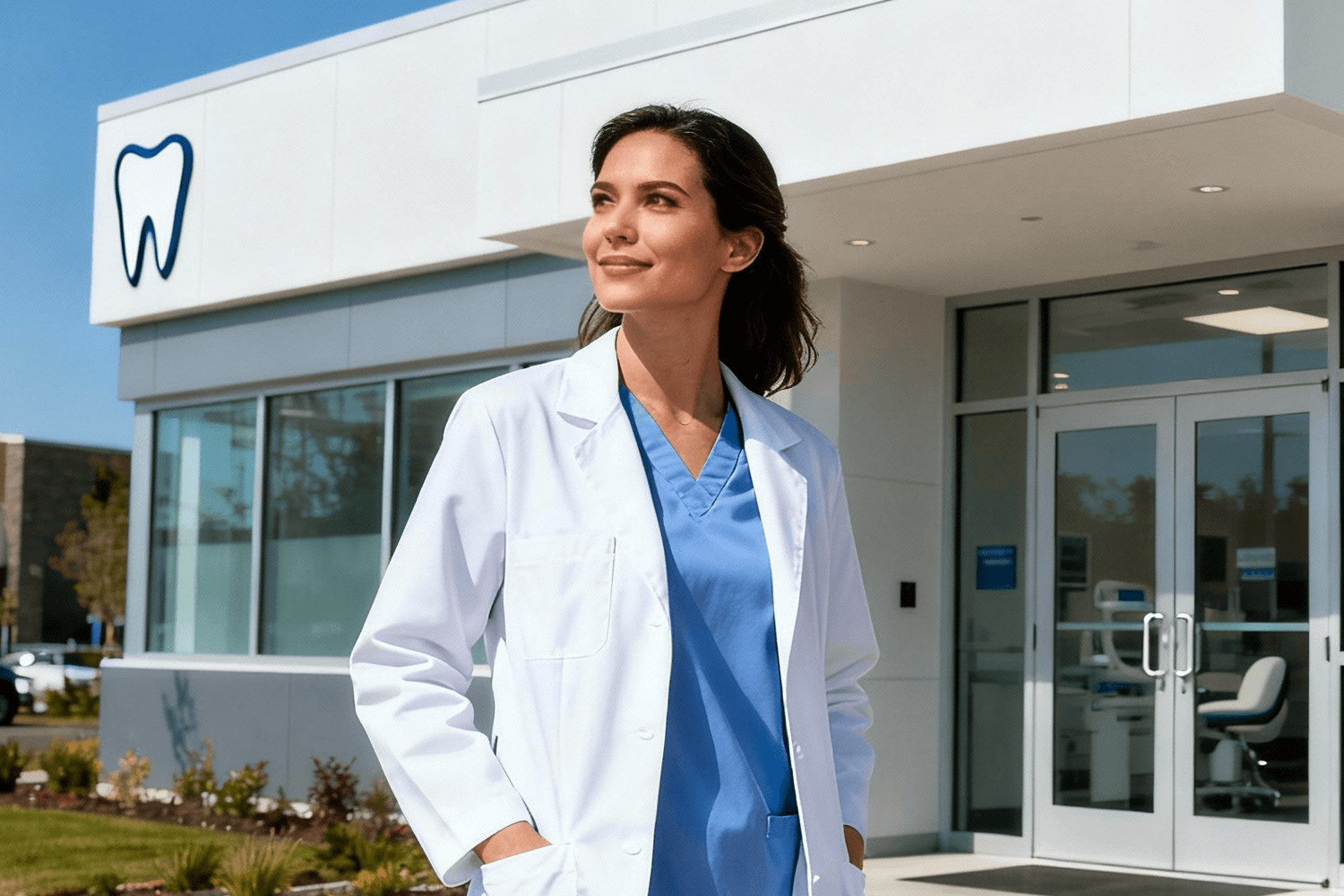When it comes to salary, oral surgeons in private practice often out-earn their employed peers, and the gap can be significant — often a difference of $100,000 or more. Oral surgeons (also known as oral and maxillofacial surgeons) are dental specialists who perform surgeries like wisdom teeth removal, dental implants, and jaw corrections. In private practice, they may own their clinic outright or work as an associate under another owner.
Let's compare earnings by role and region, outline typical expenses and income potential, and walk through how to finance your own practice.
Average Oral Surgeon Salary in Private Practice vs. Employed Roles
Nationally, oral and maxillofacial surgeons (OMFS) earn some of the highest salaries in the field of dentistry. According to the U.S. Bureau of Labor Statistics, the mean salary is around $334,310 in the U.S. However, compensation varies based on setting:
Oral and maxillofacial surgeons employed at private dental offices earn an average of $351,320 per year.
Hospital-employed oral and maxillofacial surgeons earn an average of $260,200.
OMFS employed by outpatient care centers earn an average of $204,700.
The highest-paying roles are almost always private practice ownership, where surgeons benefit from production-based bonuses and lower administrative fees over time.
Salary Range by US Location
Geography and experience level are the biggest drivers behind how surgeons are paid. Here's a breakdown of average OMFS salaries by U.S. region, illustrating a great range:
| Oral Surgeon Salary Comparison Table | |
|---|---|
| State | Average annual salary |
| New York | $284,270 |
| California | $221,820 |
| Texas | $343,668 |
| Florida | $275,661 |
| Illinois | $357,453 |
Cost-to-Income Overview for Private Practices
Running an oral surgery private practice comes with substantial operational costs, but the earning potential still exceeds that of employed roles. Understanding both revenue and expense breakdowns is key to projecting net income accurately.
Major costs typically include:
Equipment and technology. Surgical chairs, CBCT scanners, sterilization tools, and electronic health records systems.
Real estate and utilities. Office rent or mortgage, property taxes, and utility bills, depending on the location.
Staff salaries and benefits. Assistants, hygienists, office managers, and billing coordinators often make up around a third of total operating expenses.
Marketing and patient acquisition. Website development, paid ads, referral partnerships, and community events.
Administrative overhead. Insurance, software, supplies, legal, and accounting services.
On average, gross income for a successful private oral surgery practice often exceeds $1 million annually, depending on the location and patient volume. After overhead, net income for the owner often falls between $400,000 and $700,000, which is still significantly higher than most employed roles.
Factors That Influence Earnings in Private Practice
While private practice can lead to a higher salary, actual earnings vary widely. Several factors influence how much an oral surgeon makes with their own practice — some are controllable, others are not.
Case Volume and Referral Relationships
More procedures typically mean more income. Establishing strong referral ties with general dentists, orthodontists, and medical providers can directly increase patient flow.
Location and Real Estate Costs
Practices in major cities or high-cost areas like New York City often face steeper rent or mortgage payments but also enjoy higher procedure fees and patient volume.
Insurance Mix and Patient Demographics
Serving areas with more private-pay or PPO patients tends to result in higher collections than practices heavily reliant on Medicaid or HMOs.
Specialty Procedures Offered
Offering in-demand services like TMJ surgery, dental implants, or orthognathic procedures can boost per-patient revenue.
Business Management Skills
From hiring and payroll to marketing and financial planning, an owner's ability to manage operations efficiently has a direct impact on profitability.
Case Mix and Specialties
Oral surgeons who provide a wider variety of valuable procedures usually earn more money. Specialized services raise income per case and draw in more complicated referrals.
Common high-revenue specialties include:
TMJ surgery. These procedures are complex and often reimbursed at higher rates due to surgical difficulty and post-op care requirements.
Dental implants. Each implant can generate $3,000-$6,000, especially when paired with bone grafting or sinus lifts.
Teeth extractions. While routine, high volume makes this a consistent and scalable revenue stream.
Orthognathic surgery. These jaw realignment procedures are typically well compensated and often covered by medical insurance.
Sleep apnea appliances and surgery. Growing demand for alternatives to CPAP devices has made this a lucrative specialty in some markets.
Offering these services allows oral and maxillofacial surgery practices to differentiate themselves from general dentists and increase overall case value.
Referrals and Network Strength
In oral surgery, the majority of new patients come through referral relationships. The stronger the referral base, the more stable and predictable the income.
General dentists. These providers are the primary source of referrals for extractions, implants, and biopsies.
Orthodontists. They often refer patients for exposure and bonding, impacted canines, or jaw surgery.
Long-term patient base. Building trust through excellent care and follow-up creates repeat procedures and family referrals over time.
Surgeons who actively nurture professional networks see steadier growth and fewer appointment gaps.
Workload and Scheduling
How much a surgeon earns is also tied to how often and how efficiently they work.
Part-time surgeons. Typically earn less than $200,000 annually due to lower case volume and limited patient availability.
Full-time surgeons. Can exceed $350,000 or more in private practice, especially when operating multiple days per week.
Scheduling efficiency. Minimizing downtime between cases and using assistants or surgical suites smartly can dramatically improve productivity and income.
Maximizing chair time without burnout is key to maintaining high revenue and consistent patient satisfaction.
Education and Training
Becoming an oral surgeon requires years of specialized education. It also requires significant investment along the way.
High school and undergraduate studies. Students must complete strong science coursework and have competitive GPAs.
Dental school (DDS or DMD). A four-year program covering general dentistry and oral health foundations.
OMFS residency. A four- to six-year surgical residency, often hospital-based, that includes anesthesia, trauma, and facial reconstruction training.
Dual degree and MD programs. Some residencies offer a combined medical degree (MD), adding time and cost but expanding surgical credentials.
Extensive training programs. These cover everything from craniofacial surgery to tumor resection, making OMFS one of the most rigorously trained dental specialties.
Student loans. Many surgeons graduate with $200,000-$300,000 in educational debt, which can significantly reduce net income in the early years of practice.
Despite the lengthy training process and initial expenses, the long-term income potential is still one of the highest in health care.
Financing Your Oral Surgery Practice
Launching your own oral surgery practice requires careful financial planning. Choosing the right financing option can help you take ownership more quickly, lower your risks, and support steady growth from the beginning.
Here are four common financing paths for private practice owners, along with a step-by-step guide to acquiring your first practice.
SBA Loan Dental Practice
SBA loans are one of the most popular ways to fund the acquisition of a dental or oral surgery practice. Backed by the U.S. Small Business Administration, these loans offer longer terms and lower interest rates than many alternatives.
How it works. The SBA guarantees a portion of the loan, making it easier to qualify with competitive rates.
Eligibility. Applicants must have at least $10,000 in monthly revenue, be in business for over six months, and operate in the U.S.
Terms and rates. Repayment periods can extend up to 10-25 years, with APRs starting at 5.75% depending on creditworthiness.
Use case. Many oral surgeons use SBA loans to buy into a partner's practice or fully acquire an existing office, leveraging long-term financing to avoid high upfront costs.
Clarify Capital's SBA loans for Medical Professionals are tailored to health care specialists like oral surgeons.
Equipment Financing
Outfitting a practice requires major investments in technology, and equipment financing makes it more manageable.
What it covers. Chairs, imaging tools, sterilization systems, and other surgical or diagnostic devices.
Lease vs. buy. Leasing lowers upfront costs but often costs more over time. Buying builds equity and long-term savings.
Revenue impact. Updated equipment improves patient outcomes, expands services, and helps justify higher fees for complex cases.
Clarify Capital offers equipment financing for dentists, with fast approvals and no collateral required.
Lines of Credit
Having credit available before it's needed helps you respond quickly to opportunities or emergencies. A business line of credit also gives oral surgeons flexible access to cash for day-to-day expenses without committing to a lump-sum loan.
Typical uses. Cover payroll, pay marketing vendors, handle seasonal slowdowns, or bridge billing gaps.
Short- vs. long-term. Short-term lines may be better for recurring expenses, while longer-term credit works well for large campaigns or renovations.
Clarify Capital's small business lines of credit are available with same-day funding for credit scores over 550.
Working Capital Loans
Working capital loans help maintain operations during periods of growth or cash flow gaps, which is especially useful during ownership transitions.
Definition. A short-term loan used to fund operating costs, not fixed assets or long-term investments.
When to use. Ideal when collections slow, marketing costs spike, or temporary staff are needed.
Terms and speed. Approvals can happen in 24 hours with repayment plans designed to match revenue cycles.
Explore Clarify Capital's working capital options tailored to dental specialists and private health care practices.
Path to Practice Ownership
For many oral surgeons, owning a practice is the ultimate career goal, and it's achievable with the right preparation and partners. Here's what the path often looks like:
Save for a down payment. Most lenders require at least 10-20% down, so early saving is critical.
Secure lender pre-approval. This helps you understand your financing capacity and show sellers you're serious.
Find the right practice. Work with brokers or dental consultants to identify practices with growth potential and strong patient bases.
Complete acquisition. Finalize legal documents, financing agreements, and transition plans with staff and patients.
Grow revenue in year one. Focus on marketing, referrals, and high-margin procedures to ramp up collections quickly.
Prepare for challenges. Expect early hurdles like staff turnover, billing transitions, or learning practice management systems.
Success Story: From the US Army to Private Practice
Dr. Logan Curtis, DDS, worked full-service for the U.S. Army before launching Upstate Oral Surgery and Dental Implants in Watertown, NY. To finance his new private practice, he secured a $919,900 SBA-backed loan that covered initial costs for space, equipment, and staff. He began with a seven-person team and has since grown to 15 employees, with plans to expand into a larger office and bring on additional surgeons.
His practice focuses on high-demand procedures, such as dental implants and wisdom teeth removals. These have significantly increased both revenue and patient volume. Moving from military service to owning a business came with challenges, including managing operations, navigating loan paperwork, and growing marketing efforts. However, the benefits of ownership have far outweighed these difficulties.
Dr. Curtis notes that the most rewarding parts of owning his own practice include a higher income, control over scheduling, the freedom to focus on his specialties, and the satisfaction of building a trusted local brand.
This success illustrates how a properly structured SBA loan, paired with strategic staffing and a specialty case mix, can help an associate shift into a 7‑figure private practice owner.

Maximizing Your Career Potential as an Oral Surgeon
Owning a private practice offers unique rewards: higher salary potential, autonomy, and flexibility in choosing specialties and schedules. But maximizing those benefits means balancing costs and income and using financing tools wisely. Here are a few tips to keep in mind:
Plan your case mix around high‑value offerings like dental implants, TMJ surgeries, and referral‑driven procedures to increase income.
Keep operational costs in check: efficient scheduling, regular equipment maintenance, and smart real estate decisions reduce overhead.
Leverage financing options — SBA loans, equipment financing, lines of credit, and working capital — to scale without overextending.
When you're prepared to take ownership seriously, Clarify Capital can help you obtain the funding you need to make the leap. Apply today to explore financing for dental practice acquisition, equipment, or working capital with Clarify Capital.
Frequently Asked Questions
Considering private practice or curious about long-term income potential? These common questions about oral surgeon salaries and career decisions help clarify the financial landscape for OMS professionals.
How Much Do the Highest-Paid Oral Surgeons Make?
The highest-paid oral surgeons, particularly those who own private practices in high-demand urban areas, can earn over $300,000 annually. These figures often reflect a combination of complex case volume, ownership equity, and efficient operations.
Can Oral Surgeons Have Their Own Practice?
Yes, oral surgeons often own and operate private practices, either by launching new clinics or acquiring existing ones. Ownership offers the potential for significantly higher income, more control over scheduling, and the ability to build a brand focused on preferred specialties. However, it also comes with responsibilities like staffing, compliance, marketing, and financial management, which makes the right financing and preparation essential.
Is the Average OMS Salary Worth the Student Debt?
For many oral surgeons, the debt is worth it. Many graduate with student loans between $200,000 and $300,000. However, their earning potential is among the highest in dentistry. High salaries, especially in private practice, typically allow surgeons to pay off their loans in just a few years while also growing their wealth.

Bryan Gerson
Co-founder, Clarify
Bryan has personally arranged over $900 million in funding for businesses across trucking, restaurants, retail, construction, and healthcare. Since graduating from the University of Arizona in 2011, Bryan has spent his entire career in alternative finance, helping business owners secure capital when traditional banks turn them away. He specializes in bad credit funding, no doc lending, invoice factoring, and working capital solutions. More about the Clarify team →
Related Posts





